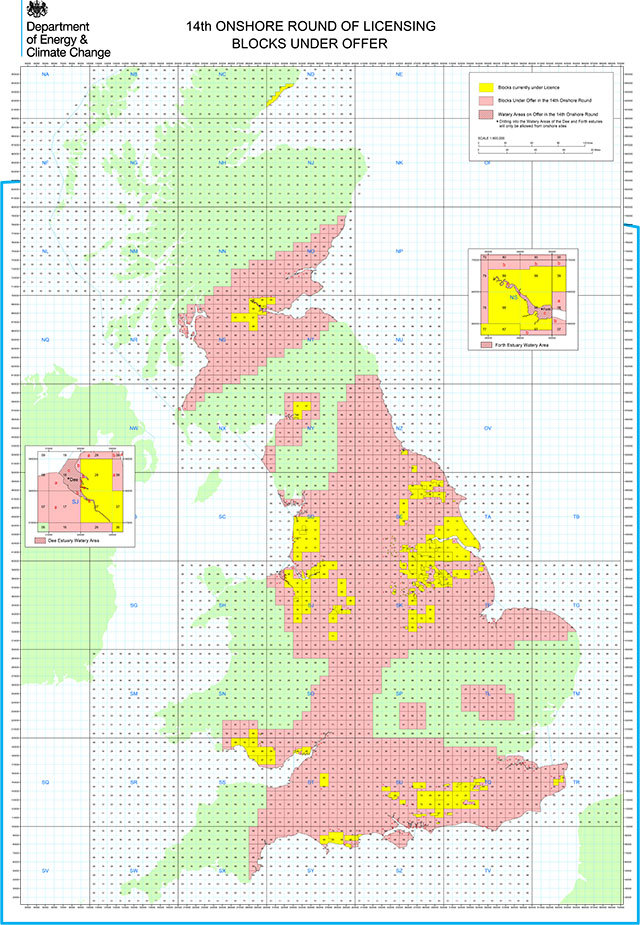
Rules to protect national parks from fracking are a “sham”, campaigners have claimed.
Ministers said the controversial process of fracking in national parks, areas of outstanding natural beauty (AONBs) and the Broads should be refused other than in “exceptional circumstances and in the public interest”.
But environmentalists warned that as the Government has indicated that developing shale gas and oil resources is in the interests of the country, the rules created a “giant loophole” that could allow fracking in protected areas.
The new guidance for planners considering applications from shale companies was unveiled as the latest bidding process opens for companies seeking licences to explore for oil and gas across swathes of the UK.
In the guidance, planners are told to put great weight on conserving the scenic beauty and landscapes of national parks, AONBs and the Broads.
If an “unconventional” oil or gas exploration scheme represents a “major development” it should refused unless there are exceptional circumstances and it is in the public interest.
Planners will have to consider the need for the development, including national considerations, the cost and scope for developing elsewhere and the detrimental effects on the environment, landscape and recreational opportunities in the area.
If proposed development for shale oil or gas would lead to substantial harm or to loss of a World Heritage Site, planners should refuse consent “unless wholly exceptional circumstances apply”, the guidance says.
Where an application in these areas is refused and the developer launches an appeal, Communities Secretary Eric Pickles will consider whether to make the final decision himself to ensure the policy is being properly applied.
Business and energy minister Matthew Hancock said: “The new guidance published today will protect Britain’s great National Parks and outstanding landscapes, building on the existing rules that ensure operational best practices are implemented and robustly enforced.
“Ultimately, done right, speeding up shale will mean more jobs and opportunities for people and help ensure long-term economic and energy security for our country.”
But Greenpeace UK energy campaigner Simon Clydesdale said: “The supposed tougher rules to protect our beloved national parks from fracking are a sham.
“Ministers have banged on for months about shale drilling being in the national interest.
“Now, by introducing an exception under a vague ’public interest’ case, they’ve created a giant loophole that could allow fracking all over these protected areas, potentially causing serious environmental damage to our unique natural heritage.
“Ministers can’t have their cake and eat it. If they’re serious about protecting out national parks, they should have made them off limits to shale drillers.”
The latest round of drilling licences includes much of the UK, including regions assessed as having shale resources, and covers areas in several National Parks including the Peak District, the North York Moors and the South Downs National Parks.
The Government has committed to going “all out for shale”, claiming development of the gas and oil resource is needed to improve energy security, boost jobs and the economy and bring down energy prices.
But opponents say it causes disruption and damaging development in the countryside, can cause minor earthquakes and the risk of water pollution, and that exploiting new oil and gas resources is not compatible with tackling climate change.
Friends of the Earth’s energy campaigner, Tony Bosworth, said: “Today the risk of fracking has spread. This threat to the environment and public health could now affect millions more people.
“Those who thought that fracking would only happen in other places will now worry about it happening on their doorstep.
“Fracking is increasingly politically toxic and is far from being seen as the holy grail of energy policy by those local to proposed drilling sites.”
And Jenny Banks, climate and energy specialist at WWF-UK, said: “Tackling climate change means at least two thirds of the world’s fossil fuel reserves need to stay in the ground.
“The UK Government should draw a line and leave shale gas and other unconventional fossil fuels in the ground rather than opening up half the country for drilling.
“To improve our energy security we should invest in energy efficiency and building sustainable renewables which, unlike shale gas, will not run out.”
The new licensing round and the move to reassure people that beauty spots would be protected comes after West Sussex County Council turned down an application for exploration near a picturesque village just outside the South Downs National Park.
The licences provide the first step to start drilling but do not give an absolute agreement to drill. Planning permission, permits from the Environment Agency and agreement from the Health and Safety Executive are required for drilling to go ahead.
